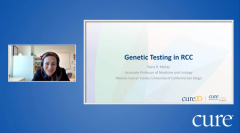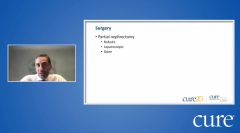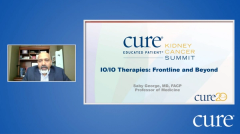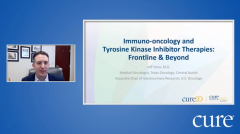
Educated Patient® Kidney Cancer Summit IO/IO Therapies Presentation: April 9, 2022
Watch Dr. Saby George, from Roswell Park Comprehensive Cancer Center, discuss treatment with the combination of immunotherapies, during the CURE Educated Patient Kidney Cancer Summit.
The use of immunotherapy agents in combination with one another as a frontline treatment option in patients with kidney cancer offers the best response rates as well as median overall survival, compared with single-agent tyrosine kinase inhibitors (TKIs) or a combination of TKIs and checkpoint inhibitors, according to an expert.
In a recent discussion during CURE®’s Educated Patient Kidney Cancer Summit, help April 9, Dr. Saby George, director of Network Clinical Trials at Roswell Park Comprehensive Cancer Center in Buffalo, New York, highlighted both the current, and potential future use of immunotherapy combinations in patients with kidney cancer.
Before he delved deeper into the use of these agents, he noted that prior to the emergence of immunotherapy combinations, the most common first choice treatment options for metastatic kidney cancer were either Sutent (sunitinib) and pazopanib.
But over time, as he explained, other agents and treatment regimens came into the mix.
During his presentation, George primarily highlighted the significance of the results of the CheckMate-214 trial. These
In fact, the data emphasized that at a minimum follow-up of 42 months, the median overall survival of patients who received the combination was 47 months versus 26.6 months for those who received Sutent alone.
“Nearly doubling of survival based on this application of this regimen combining Opdivo and Yervoy,” he said during the presentation. “This was (a) very significant result.”
Moreover, George expressed, that of the patients who achieved a complete response to treatment, 34% remained on therapy at the 42-month follow-up. Additionally, 47% of those complete responders were off of treatment, but did not require any subsequent maintenance therapy since they continued to derive a benefit.
“It's very interesting to note that a lot of those patients … did not require treatment for years,” he said. “Yet, (the) cancer did not progress; meaning they maintained the complete response.”
Salvage Therapy
George also reviewed data from a trial that looked at the use of Opdivo and Yervoy in what is called the salvage setting, meaning treatment that is given to a patient after standard treatments have failed to induce a response. In that trial, he explained, patients with heavily pretreated disease achieved a response rate close to 17%. Which, he said, could be promise for that patient population.
“If patients have gone through checkpoint inhibitors in the past; gone through multiple other treatments like TKI, mTOR inhibitors and when (and) if they run out of choices, this could be something that (they) can reconsider,” he said.
Mainstay
Ultimately, the use of immunotherapy combinations such as Opdivo and Yervoy have been established as a mainstay treatment option for patients whose disease has failed to respond to previous treatments.
“(Immunotherapy combinations) provides the longest median overall survival advantage compared to any other studies in the firstline (setting), and immune-related adverse events from (immunotherapy combinations) does not necessarily mean that it will adversely affect survival,” he concluded. “Indeed, it is pointing that they may live longer. And long-term remissions or durable responses are possible in a fraction of patients from this regimen and a lot of patients did not require a second treatment. That’s the beauty of this regimen. And salvage (therapy) with the (immunotherapy) combinations is still possible even after prior exposure to (an immunotherapy) agent.”















